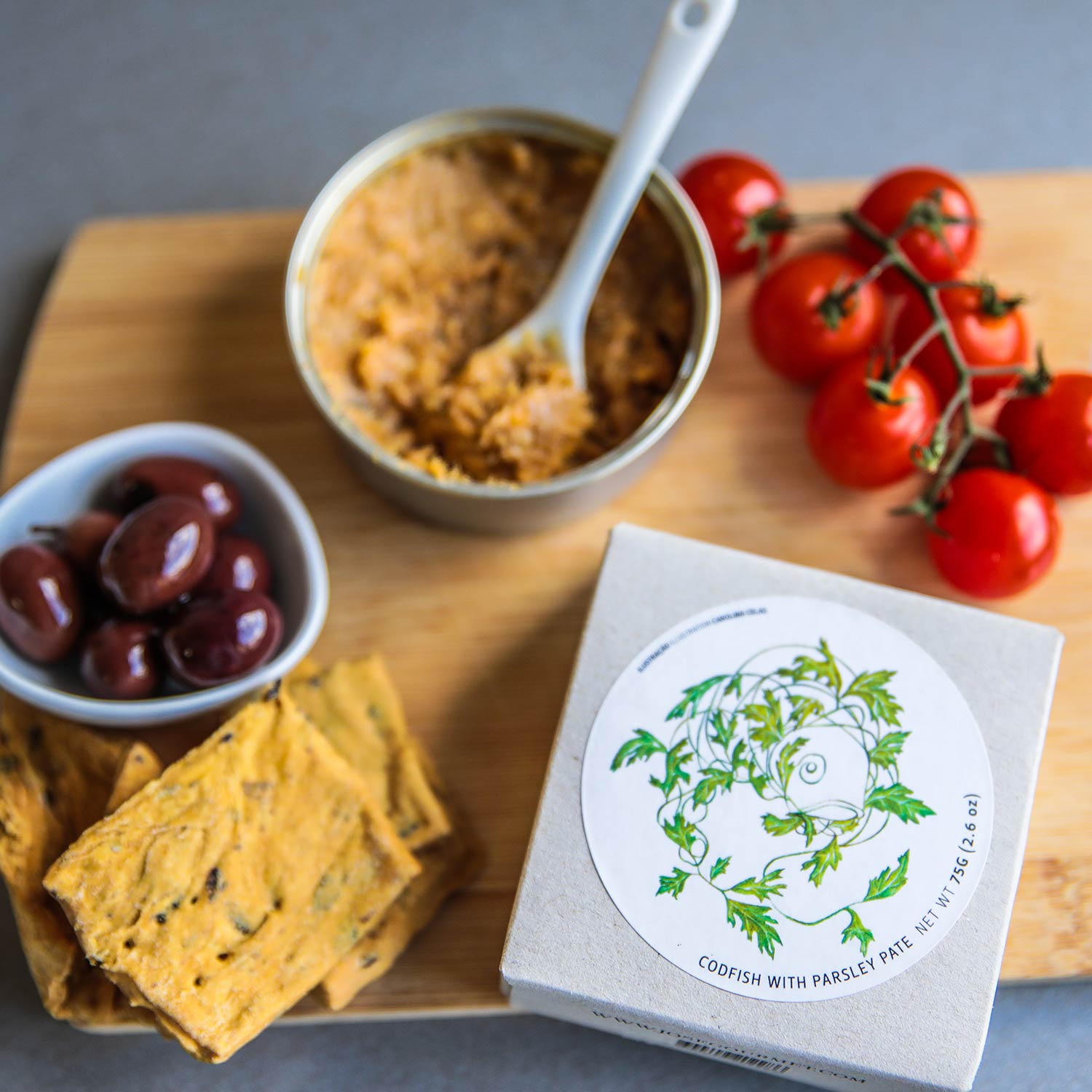In this article, we’ll explore the health benefits of tinned fish and which fish you can eat to get specific nutrients.
We'll also answer some questions related to mercury content.
The short answer? Yes!
We know finding healthy food options that don’t sting your bank account can be difficult. That’s why we don’t hesitate to recommend tinned fish as an excellent addition to your pantry. Each conserva can cover a lot of bases, ensuring you get a whole of host of vitamins and minerals in your diet that will help you stay fit and healthy in the long term. Here's our list of 8 nutritional benefits that you can expect if you dig in to these seafood delicacies:
Lean protein
To start off with, canned fish contains a lot of lean protein, one of the core nutrients that supports a lot of your major body functions. It's also involved in the formation of critical tissue and body functions, such as your blood, organs, skin, and nails. With such a high-value nutrient included, you can guarantee that any fish tin you choose is a conscious, healthy decision. A few ways lean protein helps your body:
- Maintains healthy cells
- Supports in building muscle and making contraction more efficient
- Repairs tissue
- Assists with wound healing and recovery
- Can provide you with a great energy boost
Great options: Tuna, Octopus, Anchovies and Trout

Vitamin B-12 (Colabalamin)
B-12 plays a vital role in maintaining good health and can often help to give you a spring in your step. If you’re ever feeling low on energy or perhaps a bit cranky, a tin full of B-12 goodness might turn your spirits around. Mayo Clinic suggests that deficiencies in B-12 can often lead to anemia, fatigue or mood disturbances. It can also help more serious ailments like heart and blood vessel disease at bay.
A few examples of how B-12 helps you:
- Helps your body produce red bloods cells
- Can support bone health
- Can reduce risk of vision degeneration
- May improve moods (related to stress)
- May benefit your brain and memory
- Healthy hair, skin and nails
Great options: Clams, Octopus, Shellfish, Mussels and Mackerel

Vitamin D (calciferol)
Often nicknamed the “sunshine vitamin”, Vitamin D is naturally produced by your body with natural sunlight. That said, you can also get it from foodstuffs, including your regular fish in a tin! A lot of people often get diagnosed as vitamin D deficient during the cold, dark winter months when they get less sun exposure. What better reason to get warm and comfortable indoors with a tin of sardines to help? A few positive benefits of vitamin D include:
- Supporting your body in absorbing and retaining calcium and phosphorus
- Bone health
- Cognitive health
- Can reduce cancer cell growth
- Helps control infections
- Reduces inflammation
Great options: Salmon, halibut, sardines, tilapia and tuna

Omega-3 Fatty Acids
In general, your body can make the majority of the fats it needs on its own – except for these ones! While you can find them in foods like in some nuts and vegetable types, the most famous and recommended source is in fish. To build your Omega-3 resources, aim for the fattier, oiler type fishes like tuna and mackerel.
Some health benefits of Omega-3:
- Helps build cell membranes
- Affects the function of the cell receptors in these membranes
- Supports with regular blood clotting
- Facilitates contraction and relaxation of artery walls
- Can reduce inflammation
- Helps prevent heart disease and stroke
- May play protective roles in cancer and other conditions
Great options: Tuna, Swordfish, Whitebait and Mackerel

Choline
An essential nutrient which is produced in very small amounts by the liver. However, it doesn’t produce all the choline it needs – so why not help out with a tin of your favorite salmon?
- Good brain health
- Helps form acetylcholine, a major neurotransmitter that supports numerous nervous systems
- Helps maintain cell structure
- Helps remove fat and cholesterol from the liver
Great options: Oysters, Salmon, Cod, Tuna and Haddock

Iron
Did you know that about one third of the world’s population may be iron deficient? Make sure you aren’t part of the group! Iron plays a critical role in the transportation of oxygen in your blood – without it, you can't tap into your full energy capacity. Why risk tackling your daily life without being at your best? A few positive points about iron:
- Key nutrient involved in the transportation of oxygen in your blood
- One of the core component of myoglobin – a special protein that stores oxygen in muscle cells
- Helps support many of the body’s enzymes – critical for many cell functions
- Immune system – gives your body more support to fight infection
Great options: Tuna, Salmon, Anchovies, Mackerel and Hake

Iodine
Iodine is another one of the nutrients on this list that your body cannot produce on its own. It is critical in ensuring that your thyroid functions properly (and preventing a host of health conditions). A few benefits of iodine:
- Helps create proteins and enzyme activity
- Regulates normal metabolism
Great options: Cod, Halibut, Pollock, Crab, Scallops and Squid

Calcium
Last but certainly not least, Calcium is the most abundant mineral in the body. All of your reserves are stored inside your bones and teeth, giving them their strength. It also works hand-in-hand with Vitamin D (another benefit of canned seafood). Mayo Clinic even suggests that the pair may help to protect against high blood pressure, diabetes, and cancer.
A few health benefits of having enough calcium:
- Keeps your teeth and bones healthy with structure and hardness
- Helps with your muscles and nerves
- Helps blood vessels move blood around your body
- Helps release hormones
Great options: Sardines, Salmon, Shrimp, Pike and Herring

Want to look further into which other foods also have these nutrients and it what quantities? We used MyFoodData’s nutrient ranking tool for our article as inspiration for healthy options.
We hope this guide has helped give you an idea of the benefits you can expect from jumping into the world of tinned fish. We offer a number of these options in our online store, but we're always on the look-out for more delicious, high-quality choices for you to enjoy.
Know any other health facts that we missed?
Get in touch with us and let us know!
We mentioned all the benefits but we often get an important question that needs answering.
Does canned fish have mercury?
Fish naturally take up mercury from streams and oceans as they feed. That means that it is often present in fish that you buy fresh as well as in the tins you can find online and in stores. If you’re a healthy adult, you have nothing to worry about as your body can and does get rid of mercury over time. However, it is good to know that international researchers advise healthy adults to not exceed 2 to 3 servings per week (one serving =150g).
Is this an issue you’re concerned about? Professionals recommend starting with sardines, scallops and anchovies as these have been shown by the USFDA to contain the lowest mercury levels in commercial fish. If you want to double-check mercury levels in more detailed by fish type, the FDA has provided great data to look through.
The questions we get about mercury are often related to the warning you may see on some of our products. This is specifically targeted at women who are pregnant or planning on a pregnancy. The mercury levels in these products, even when low, may have a harmful impact on babies in the womb.
Are you pregnant or planning on a pregnancy? Or are you a parent of children between the ages of 1-11? The FDA has provided a handy guide that you can refer to with advice about eating fish to avoid any harmful effects.
This guide was written based on our research and through compiling information from trusted sources. We aimed for accuracy and up-to-date information in our content. However, while we are big enthusiasts of conservas and tinned fish, we are not medical experts. For more questions and concerns on specific dietary needs and health implications, please speak to a qualified medical professional.








